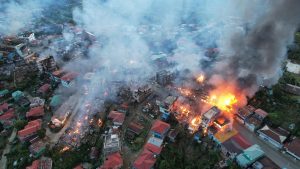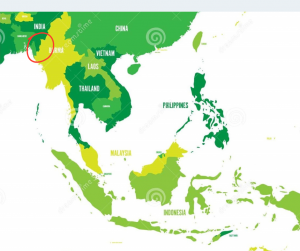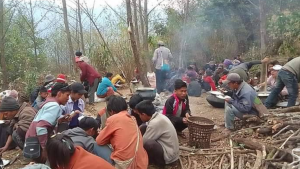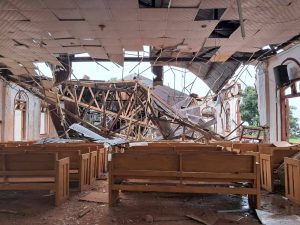Human Rights and Humanitarian Situation in Post-Coup Chin State and the Mizoram Border
Since the military coup in 2021, Chin State and Burma’s northwest, including the border with India’s Mizoram State, have been engulfed in a worsening humanitarian and human rights crisis. The military’s scorched-earth tactics, known as “Four-Cuts,” have led to unprecedented displacement and destruction. More than half the population of Chin State have fled their homes, including approximately 180,000 internally displaced persons (IDPs) within Chin State and as many as 800,000 refugees seeking safety in India’s Mizoram State.

Inside Chin State, entire communities have been cut off from essential services due to military blockades and targeted airstrikes. Civilian populations are suffering without access to food, healthcare, and education. Religious structures, particularly Christian churches, have been destroyed, undermining not just shelter but the spirit and cohesion of the communities. Humanitarian access remains restricted, with UN agencies, INGOs, and other aid providers unable to deliver support due to junta-imposed roadblocks and security risks.
 On the Mizoram border, the humanitarian response faces its own set of challenges. Security concerns along the India-Burma border have increased as the Burmese military intensifies its crackdown, and the Indian government has tightened restrictions on cross-border activities. While Mizoram State has shown solidarity by tacitly allowing the flow of refugees, New Delhi’s bureaucratic and diplomatic constraints have limited humanitarian interventions. The absence of the UN and international diplomatic missions in northeast India, which contrasts starkly with the presence and ease of access on Burma’s eastern borders with Southeast Asia, exacerbates the situation. The Burma issue is managed through diplomatic structures in Bangkok, which has direct access to border regions, but the western front along South Asia remains geographically isolated, with ongoing restrictions that prevent humanitarian missions and international presence in Mizoram. Aid provision on this border is further hampered by diplomatic red tape and bureaucratic protocols, demanding more flexible and creative approaches for cross-border aid.
On the Mizoram border, the humanitarian response faces its own set of challenges. Security concerns along the India-Burma border have increased as the Burmese military intensifies its crackdown, and the Indian government has tightened restrictions on cross-border activities. While Mizoram State has shown solidarity by tacitly allowing the flow of refugees, New Delhi’s bureaucratic and diplomatic constraints have limited humanitarian interventions. The absence of the UN and international diplomatic missions in northeast India, which contrasts starkly with the presence and ease of access on Burma’s eastern borders with Southeast Asia, exacerbates the situation. The Burma issue is managed through diplomatic structures in Bangkok, which has direct access to border regions, but the western front along South Asia remains geographically isolated, with ongoing restrictions that prevent humanitarian missions and international presence in Mizoram. Aid provision on this border is further hampered by diplomatic red tape and bureaucratic protocols, demanding more flexible and creative approaches for cross-border aid.
Increased Need for Swift International Support
Given the complex dynamics on the India-Burma border and inside Chin State, urgent international intervention is needed. The international community providing supports must work closely with trusted local partners with proven track records along the India-Burma border. Local organizations like the Chin Human Rights Organization (CHRO) have continued to provide essential services and documentation under extreme constraints, demonstrating resilience and reliability.
 The international community should consider implementing more flexible arrangements for cross-border humanitarian assistance. The traditional bureaucratic models for aid delivery are unsuited to the rapidly evolving needs of communities in Burma’s western regions. Cross-border operations should prioritize low-profile, adaptable mechanisms that can navigate the restrictive environment and ensure that critical aid reaches those in need.
The international community should consider implementing more flexible arrangements for cross-border humanitarian assistance. The traditional bureaucratic models for aid delivery are unsuited to the rapidly evolving needs of communities in Burma’s western regions. Cross-border operations should prioritize low-profile, adaptable mechanisms that can navigate the restrictive environment and ensure that critical aid reaches those in need.
Security and Protection Concerns
The threat of sustained military airstrikes in Chin State is likely to persist, making civilian protection a top priority. Swift measures are required to protect civilians, including providing both financial resources and technologies to enhance community-based protection mechanisms. The international community should invest in early warning systems, shelters, and training to help communities mitigate risks associated with aerial bombardments.
Beyond immediate protection needs, there is an urgent need for resources to support the documentation and investigation of human rights violations. Robust data collection, in accordance with international legal standards, is critical for accountability mechanisms and future transitional justice efforts. By accelerating documentation, we can ensure that evidence is preserved for use in international courts and other accountability forums, including the UN’s Independent Investigative Mechanism for Myanmar (IIMM).
Sustained Support for Human Rights Work and Defenders
CHRO, as a leading organization in the field of justice and accountability, plays a pivotal role in documenting crimes and advocating for the rights of Chin people and other ethnic groups in Burma. The organization’s work has been instrumental in filing cases under universal jurisdiction and contributing evidence to international bodies. Sustaining and expanding this work is vital not only for Chin communities but also for Burma as a whole. CHRO’s expertise should be supported to enable collaboration and knowledge-sharing with other key human rights organizations in Burma, ensuring that a coordinated and comprehensive approach to justice and accountability is taken.
In light of these challenges, it is imperative that international donors provide long-term financial and moral support to CHRO and other human rights defenders working under dire conditions. Supporting these organizations is essential for ensuring that justice is pursued, and that Burma’s ethnic and religious communities receive the protection and dignity they deserve in the face of military brutality. The path forward must prioritize both immediate humanitarian needs and the long-term goal of justice for Burma’s people.
